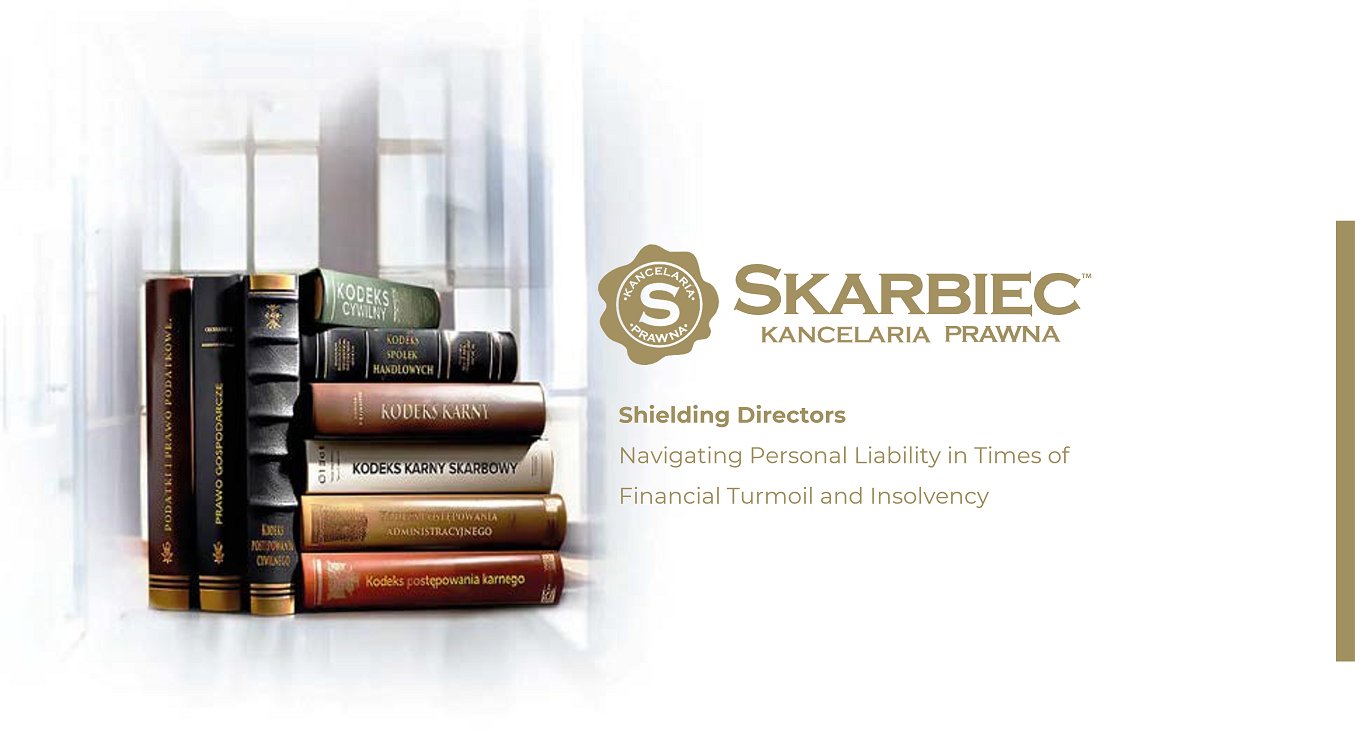
Personal responsibility for members of the Management Board under laws of Poland
Chapter 2
The general principle is that the corporate veil protects both board members and shareholders from the negative consequences of management decisions. However, in certain cases, the corporate veil can be lifted, and board members may be held legally responsible for damages caused to the company, shareholders, or even third parties. In Polish law, the legal basis for the liability of board members is defined by various statutes, including the Commercial Companies Code (CCC), Civil Code, Insolvency and Restructuring Law, Tax Ordinance, Public Offering Act, and Labor Code.
With the performance of the function of a member of the management board in a limited liability company, rights, duties, and responsibilities arise from the CCC (Article 291 and 299 of the Code) as well as from other laws, including criminal liability (Article 296 and 296a of the Criminal Code), tax liability (Article 116 of the Tax Ordinance) and liability for social insurance contributions (Article 31 of the Social Insurance System Act). Those provisions we examine in detail below.
I would venture to assert that in Polish law, the possibility of holding directors financially responsible for a company’s actions is taken to the point of questioning the very principle of “limited liability” characteristic of capital companies. The director’s responsibility under the laws of Poland resembles more the responsibility of unlimited partners in partnerships in the U.S. legal system, rather than the responsibility of executive directors or officers of a company.
An opinion formed in distant legal environments that in practice directors rarely face responsibility leading to personal financial consequences does not align with the stringent standards prevalent in Poland and the reality may come as an unpleasant surprise to directors from a US legal upbringing serving on the boards of Polish companies. In Poland, personal liability of board members is more of a rule from which one can be exempted only in exceptional circumstances.
Poland, unlike the United States, is not known for being a litigious environment. However, it can be observed that the legal environment in Poland is uniquely hospitable to litigations against directors, unlike in the United States.
When it comes to commercial liabilities, pursuing financial responsibility of board members is considered to be a standard phase of a debt recovery process, a natural act of due care on the part of creditors and their representatives. The purpose is not merely to send a strong message to future directors or to make a point in a dispute, but rather pursuing claims against directors is a routine course of action, undertaken without prior consideration of litigation costs and the time value of money.
Situation is even more hostile towards directors in case of tax debts, as Tax Ordinance is interpreted in such a way that it imposes an obligation on the tax authority to conduct proceedings regarding the liability for tax arrears of a LLCs towards all persons who may be held liable for such obligations, that in particular directors personally. To call it a routine course of action would be euphemism, as it is more of a legal necessity of part of tax authorities.
In this complex psychological situation in which business venture managers are grappling with insolvency, Polish law takes a very clear stance. We do not seek to encourage directors to take bold actions trying to save the company and put it back on path of profitability; rather, our law intends to utilize personal assets of directors to repay the debts of the company they manage, prioritizing the protection of creditors over the financial freedom of directors.
In any case, at least there is no need to fear class actions, which are routinely utilized in the United States for securities lawsuits brought by investors against directors. However, such an approach would be highly unconventional in the Polish context, offering little chance of success and presenting significant complexities during the legal process. This completely shifts the perspective compared to the United States, where such measures are a primary legal risk for directors representing a company facing insolvency. In the Polish context, the real risks are not class actions, but the transfer of obligations arising from the company’s debts to its directors personally. This includes debts stemming from the ordinary business operations of the company, as well as tax and social security obligations.
To add some comfort, it can be noted that the costs of legal proceedings are moderate enough that there is little risk of encountering a Can’t Afford to Win scenario in practice, where a director would have to discontinue the proceedings and accept responsibility simply because they could not afford to continue the case in court.

Founder and Managing Partner of Skarbiec Law Firm, recognized by Dziennik Gazeta Prawna as one of the best tax advisory firms in Poland (2023, 2024). Legal advisor with 19 years of experience, serving Forbes-listed entrepreneurs and innovative start-ups. One of the most frequently quoted experts on commercial and tax law in the Polish media, regularly publishing in Rzeczpospolita, Gazeta Wyborcza, and Dziennik Gazeta Prawna. Author of the publication “AI Decoding Satoshi Nakamoto. Artificial Intelligence on the Trail of Bitcoin’s Creator” and co-author of the award-winning book “Bezpieczeństwo współczesnej firmy” (Security of a Modern Company). LinkedIn profile: 18 500 followers, 4 million views per year. Awards: 4-time winner of the European Medal, Golden Statuette of the Polish Business Leader, title of “International Tax Planning Law Firm of the Year in Poland.” He specializes in strategic legal consulting, tax planning, and crisis management for business.







